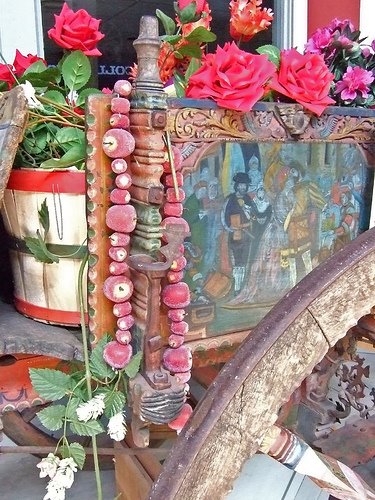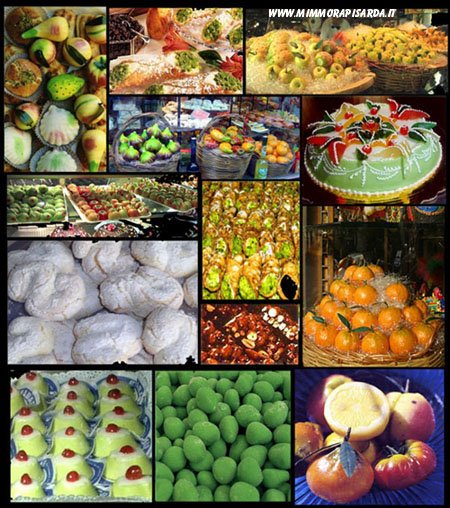 Recently, while enjoying dinner at a seaside restaurant in Mondello, outside Palermo, I noticed that the four women at the next table --all forty-ish with dark brown eyes and equally dark eyebrows-- were all "blonde." Not genuine blondes, but blondes having hair of a colour not found in nature. All four seemed to be married to the men they were with; two had young children with them. I whispered to my friend, a brunette businesswoman in her early forties, that the four wives, when observed together, were a strange sight. "Ah," she responded, "quella è la Palermo Bene." In other words, being a financially well-off man in Palermo meant that you could achieve your dream of a blonde wife!
Recently, while enjoying dinner at a seaside restaurant in Mondello, outside Palermo, I noticed that the four women at the next table --all forty-ish with dark brown eyes and equally dark eyebrows-- were all "blonde." Not genuine blondes, but blondes having hair of a colour not found in nature. All four seemed to be married to the men they were with; two had young children with them. I whispered to my friend, a brunette businesswoman in her early forties, that the four wives, when observed together, were a strange sight. "Ah," she responded, "quella è la Palermo Bene." In other words, being a financially well-off man in Palermo meant that you could achieve your dream of a blonde wife! Sicily has its natural blondes, of course, even if they're a small minority among waves of dark brunettes. It's also interesting that most of the foreign brides in Sicily seem to be natural blondes, even though the countries they come from (Russia, Romania, etc.) boast plenty of attractive brunettes and redheads. Ebony and auburn, it seems, don't hold much appeal for the typical Sicilian man. But blonde as a status symbol? In 2005? This piqued my curiosity.
In interviewing a number of Sicilian men, I was surprised to learn how many otherwise educated, astute Palermitans and Catanians didn't just prefer blondes but were actually obsessed with having a "real" one. For many, a local "bottle blonde" was the next best thing --a kind of mediocre "consolation prize" in place of the real deal.
As a dark brunette "mora" ("Moorish-haired" woman), I have to admit that I found their remarks a little offensive, perhaps indicating a certain masculine superficiality. But taste is taste. It's interesting that one of Versace's bestselling fragrances (in a bottle similar to the one on this page) is called "Blonde." Well, one imagines that the Versace organisation could have chosen something like "Brunette" but maybe there's a psychology associated with the perfume's name.
One man actually confided that a woman's "intimate" blondness was even more intriguing than the long ocks cascading over her shoulders, and an object of envy for other Italian men. His comment reminded me of the story of Marilyn Monroe making herself "all blonde" long before baring all was a routine career move.
At that point, however, I ceased my informal "research" with the men. Things were getting too bizarre. So I queried a few women. The pseudo-blonde women I spoke to (all between 30 and 45) invariably responded with vague replies referring to "change" or to a husband's preference.
One particularly candid "bottle blonde," a single woman who prefers a strange shade of platinum, went so far as to suggest that being blonde was part of a certain mentality, a state of mind inducting the pseudo-blonde into a kind of elite sorority where a privileged life awaited. On the other side of the aisle, few Sicilian men go blonde, though many paunchy, middle-aged males of varying social status dye their hair in a lame attempt to project grayless youth. (Among Italy's current crop of national politicians, Silvio Berlusconi and Romano Prodi stand out in this regard, but they are hardly alone.)
Outside Italy, several sociological studies of the attitudes of Italian immigrants and their immediate descendants (in places like the United States) over the last fifty years reveal blondeness as a social aspiration. It's surprising to encounter the same kind of thing here in Italy, but one of the women interviewed remarked that --years ago-- being a fake blonde implied the wealth necessary to afford the then-costly bleaching process, and that the old attitude continued to flourish even when hair coloring became affordable. This brings to mind the popular Eduardo De Filippo film Napoli Milionaria, in which a Neapolitan man returns home from the Second World War to discover that the newly-blonde women of his family and neighborhood are making a good living servicing American soldiers, who, if one is to accept the movie's cynical point of view, preferred blondes to brunettes.
There aren't many conclusions to be drawn from all this. It's one thing when a woman with sandy or ashen hair lightens it a shade or two, but why would a dark-haired woman want to become an unnatural orange-blonde? A male friend made an interesting point. He said that he couldn't imagine dark Italian beauties like and Monica Bellucci and Maria Grazia Cucinotta (both married) going blonde just to be "different" or to please a man. So in the end perhaps it's all a question of self-image.
Source : Best of Sicilian, Author : Maria Luisa Romano







No comments:
Post a Comment